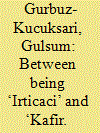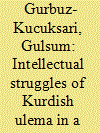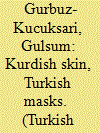| Srl | Item |
| 1 |
ID:
174140


|
|
|
|
|
| Summary/Abstract |
This article engages with Kurdish ulamas’ and shaykhs’ relatively unknown narratives on manipulative shaykhs as a legitimate part of the story of Kurdish national history. The criticism against yalancı, fake, shaykhs from within the religious class is not encountered very often in Kurdish nationalist history writing. The stereotypical and generalizing approach to shaykhs in nationalist historiography hindered the diverse nature of religious class and silenced reformist discourses against the manipulation of religion. This article brings in the examples of ‘a-typical’ Kurdish ulama and shaykhs with national dreams, who delegitimized deceptive shaykhs by uncovering their deceits. As their narratives unfold, the diverse nature of the Kurdish religious class appears and the story of Kurdish nationalism becomes more complete. My findings also challenge the nationalist dichotomy that national and religious identities are exclusive of one another.
|
|
|
|
|
|
|
|
|
|
|
|
|
|
|
|
| 2 |
ID:
174158


|
|
|
|
|
| Summary/Abstract |
Modern Kurdish thought encompasses many factions with diverse social, political, religious and ideological positions in and outside of Turkey.1 While our knowledge about the evolutions of the nationalist thought among Kurdish secular intellectuals has radically increased, the intellectual heritage of Kurdish religious intellectuals, the ulema, who have been searching for the best ways of delivering their societies from internal and external exploitations, have been mostly overlooked in Western academia. This article aims to bring to light the intellectual wrestling of a Kurdish mullah, Ali Zile of Diyarbakır, with the problems he believed Kurds faced from many angles: sheikhs, the passive madrasa tradition, the Kurdish secular/Marxist nationalism from the inside, and the Turkish nationalism and the Western imperialism from the outside.
|
|
|
|
|
|
|
|
|
|
|
|
|
|
|
|
| 3 |
ID:
173200


|
|
|
|
|
| Summary/Abstract |
Evdirrehîm Hekarî is mostly known for his Kurdish nationalist writings and activism at the end of the Ottoman Empire. He continued to be a voice for the Kurdish nation during the Republican period in his private writings, while he identified as a Muslim Turk in his publications. Hekarî’s complete rejection of secular Turkishness existed alongside his submission to Turkish Islamic discourse. His split identity and paradoxes are analyzed using Frantz Fanon’s study of the colonized man and his inconsistencies in his fight with the colonizer. In examining Hekarî’s inner inconsistencies, the article also benefits from Partha Chatterjee’s study of the contradictions of nationalist thought in its battle with colonialist power.
|
|
|
|
|
|
|
|
|
|
|
|
|
|
|
|